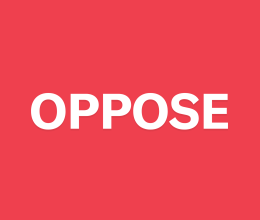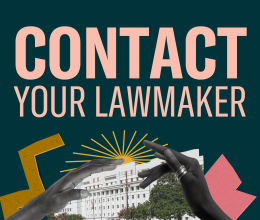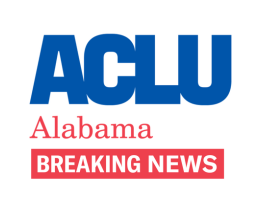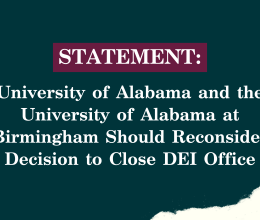
The ACLU of Alabama believes official social media pages for elected leaders and government organizations are public forums, and that blocking individuals may be an unconstitutional restriction on their right to free speech under the First Amendment.
If your elected official or government associated organization is using their social media account as a government actor, they cannot block you based on views you've expressed in public conversation or restrict your access to their profile based solely on your viewpoints. Certain speech, however, is not protected under the First Amendment, like threats.
Have you been blocked on social media by a government official?
Here are three steps that you can take to protect your First Amendment rights online.
- Contact the ACLU of Alabama. Send the ACLU of Alabama a screenshot or photograph with evidence that you were blocked on a social media page by an elected leader or government agency. Be sure to include the name and/or URL of the social media page.
*Please note that asking for or receiving these materials does not imply that the ACLU of Alabama is pursuing legal action on your behalf or in any case. This information is requested by the ACLU of Alabama exclusively for documentation and record-keeping purposes.
- Contact the office of the elected leader or government agency and request your access be unblocked.
- Request a copy of the social media policy guidelines for the page that blocked you. If social media policy guidelines are not available, urge the office or person to create them.
Additional Resources
Learn more about other cases, lawsuits, and legal briefs filed by other ACLU affiliates about social media blocking. You can also read the national ACLU's recent blog post on this topic: "Can a Government Official Block You on Twitter?"
Case #1: Utah (2017)
On August 8, 2017, the ACLU of Utah sent letters to all members of Utah's federal congressional delegation, advising that the blocking of constituents on social media platforms such as Twitter and Facebook constitutes a First Amendment violation.
Don't Block Constituents on Social Media, ACLU of Utah Warns Federal Delegation, August 8, 2017 (ACLU Utah)
ACLU warns Utah’s members of Congress not to block social media users, August 9, 2017 (Salt Lake Tribune)
Case #2: Virginia (2017)
On July 26, 2017 a U.S. District Judge ruled that a Virginia elected official violated the First Amendment by blocking a constituent on her official Facebook page. The judge wrote: “The court holds only that under the specific circumstances presented here, [the] defendant violated the First Amendment by engaging in viewpoint discrimination and banning plaintiff from a digital forum for criticizing her colleagues in the county government.” The ACLU of Virginia has filed an amicus brief in an appeal of this case.
U.S. District Judge rules Randall violated Lansdowne resident’s First Amendment right, July 26, 2017 (Loudon Times-Mirror)
ACLU of Virginia amicus brief in appeal of Davison v. Randal (ACLU Virginia)
Case #3: Indiana (2016)
On June 29, 2016 the ACLU of Indiana filed a lawsuit in federal district court on behalf of two Beech Grove, Indiana residents who were blocked from accessing or commenting on Facebook pages for the City of Beech Grove and its police department. By August the ACLU of Indiana and city officials reached an agreement allowing the residents to regain access to the city’s Facebook pages. The agreement prohibited the city from blocking users or removing comments based solely on their viewpoint. The city also adopted and posted a new “terms of use” policy for official social media pages.
Beech Grove, ACLU reach settlement in Facebook case, August 4, 2016 (Indianapolis Star)
Beech Grove Women Sue City Over Facebook Censorship, June 29, 2016 (ACLU)
Case #4: Hawaii (2014)
In 2012 the Hawaii Defense Foundation filed a lawsuit in federal district court against the Honolulu Police Department for banning users and deleting comments from the department’s Facebook page. The parties to the lawsuit, working with the ACLU, developed a new policy to govern public posting on the Honolulu Police Department’s Facebook page. On June 19, 2014, the court ordered the police department to award the plaintiffs $31,000 in attorney’s fees.
HPD Ordered to Pay $31K over Censored Facebook Comment, June 27, 2014 (Hawai'i Free Press)
Police Fan Page Brings First Amendment Lawsuit, August 21, 2012 (Hawai'i Free Press)


